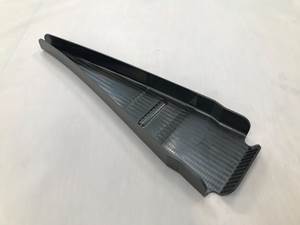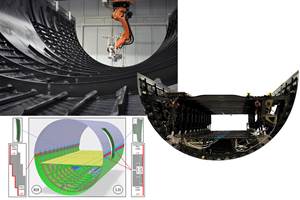Spirit Q3 financial results raise concern of business viability
Significant anticipated cash deficit and increased operating losses have raised doubts over the company’s ability to continue operations, leading to Boeing and Airbus loan advancements.
Commercial aerostructures company Spirit AeroSystems (Wichita, Kan., U.S.) has raised concerns over its business viability per the company’s Q3 2024 financial filing released on Nov. 5. While Spirit reports that its revenue from the same period in 2023 saw an increase ($1.5 billion), operating loss was much higher. Flight Global reports that Spirit’s acknowledged operating losses “the last few years raise substantial doubt about its ability to continue as a going concern.”
According to the filing, the company’s cash balance at the end of Q3 2024 was $218 million but anticipates its cash deficit will be $450-500 million between now and Q2 2025.
Spirit’s latest disclosure is led by several factors, the most recent being the 7-week strike by Boeing’s U.S. workers that halted a majority of 737 Max, 777 and 767 cargo plane production, and led to Spirit “burning through dwindling cash reserves.” Spirit announced implementation of “employee furloughs as well as other cost savings measures, including a hiring freeze and travel and overtime restrictions, in response to the ongoing strike” effective Oct. 28 for approximately 700 employees working on the 767 and 777 programs due to the buildup of a significant inventory buffer on those programs.
Operating losses were also affected by $217 million in net forward losses and $26 million for catch-up adjustments for periods prior to Q3 (compared to $110 and $64, respectively, in 2023). Net forward losses were mainly driven by the Boeing 787 and Airbus A220 programs ($109 million and $64 million, respectively), resulting from production performance as well as labor and supply chain cost growth. Unfavorable cumulative catch-up adjustments were primarily related to the Boeing 737 and 777 programs ($24 million and $16 million, respectively), and were primarily driven by higher production costs.
Ultimately, developments in 2024 have resulted in significant reductions in projected revenue and cash flows over the next 12 months. Spirit says that these developments include production and delivery process changes implemented by Boeing, lower-than-planned 737 production rates and the lack of price increases on Airbus programs.
As a result of these conditions, Spirit has drawn down a $350-million bridge loan set up when Boeing agreed to acquire the supplier in June. On Nov. 12, Boeing committed to this amount, to be paid throughout 2026, noting it will be used to “address Spirit’s high levels of inventory and lower operational cash flows, decrease in expected deliveries to Boeing and higher factory costs to maintain rate readiness and lingering effects brought on by the recent strike by Boeing employees.” The company previously disclosed it used up a $425 million customer advance from Boeing, which remains unpaid.
That same day, Spirit also announced an amendment to an agreement with Airbus, in which Airbus will provide Spirit a non-interest-bearing line of credit of $107 million. Spirit will use the line of credit as advance payments in connection with production for various Airbus programs and the continued delivery of certain products to Airbus by Spirit.
Spirit notes it remain “on track to close the acquisition by Boeing in mid-2025.” Its plans to improve liquidity — which will be affected by the outcomes of active discussions related to the timing or amounts of repayment for certain customer advances, including the advance received by Boeing, achieving forecasted 737 deliveries and the strike by Boeing employees — are expected to meet the company’s cash demands through the closing of this acquisition.
Management is also evaluating additional strategies intended to improve liquidity to support operations, including, but not limited to, additional customer advances, issuing incremental debt financing and restructuring of operations in an effort to increase efficiency and decrease expenses. “However,” Spirit notes in its filing, “there can be no assurance that these plans or strategies will sufficiently improve our liquidity needs or that we will otherwise realize the anticipated benefits.”
Related Content
ASCEND program update: Designing next-gen, high-rate auto and aerospace composites
GKN Aerospace, McLaren Automotive and U.K.-based partners share goals and progress aiming at high-rate, Industry 4.0-enabled, sustainable materials and processes.
Read MoreManufacturing the MFFD thermoplastic composite fuselage
Demonstrator’s upper, lower shells and assembly prove materials and new processes for lighter, cheaper and more sustainable high-rate future aircraft.
Read MorePlant tour: Spirit AeroSystems, Belfast, Northern Ireland, U.K.
Purpose-built facility employs resin transfer infusion (RTI) and assembly technology to manufacture today’s composite A220 wings, and prepares for future new programs and production ramp-ups.
Read MoreCombining multifunctional thermoplastic composites, additive manufacturing for next-gen airframe structures
The DOMMINIO project combines AFP with 3D printed gyroid cores, embedded SHM sensors and smart materials for induction-driven disassembly of parts at end of life.
Read MoreRead Next
Safran invests over €1 billion to develop LEAP engine MRO network
The engine-maker is scaling up global MRO capabilities with several facility builds and company acquisitions to keep pace with expected demand in the narrowbody aircraft market.
Read MoreAgreement provides framework for commercial aerospace tech research
RTX’s Collins Aerospace, Pratt & Whitney and TU Delft enhance collaboration on high-speed intelligent inspection systems to enhance composite materials development, hydrogen propulsion, industrial design and more.
Read MoreWichita’s NIAR delivers fiber metal laminate test panel to FAA
Aluminum and fiberglass fuselage panel is one of five panels that NIAR and partners are designing, fabricating and testing to assess emerging metallic structure technologies.
Read More



























